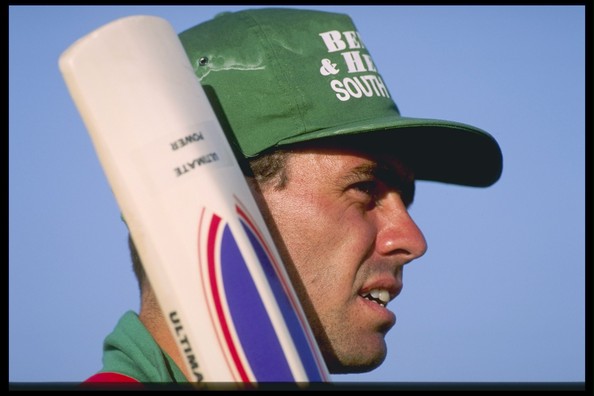Punting Profiles: Hansie Cronje
On a rain-swept and wintry night, the first of June in 2002, between the South African city of Bloemfontein and the Western Cape town of George, Hansie Cronje died and so to did the truth. It had been less than two years since the former South African cricket captain, a man adored by fans and teammates alike and described by coach Bob Woolmer as a “true leader of men”, was called on to answer charges of match-fixing and accepting money from bookmakers for what is known as “forecasting”. Cronje, aware the evidence against him was overwhelming, admitted, in part only, his guilt. Through carefully worded statements and a public relations campaign that focused on his devout Christianity and the weaknesses of humanity, Cronje “confessed” his wrongdoing and threw himself on the mercy of the public and the game. Many, however, believe his admissions were nothing more than an orchestrated campaign to win back a reputation that would have been gutted without an acceptance of transgression and that a true confession was never forthcoming. And it never will be, the skeletons Cronje had in his cupboard buried back in June of 2002 with Hansie himself.
Of course, that is how many people no doubt wanted things. The bookmakers and gangsters involved, cricket bosses across the country and the globe, former teammates and associates. A full confessional could have bought empires to their knees and prison time to many. Never has cricket endured such a crisis. Not World Series cricket. Not Bodyline. Not ball tampering scandals. International games of cricket had been manipulated for the purposes of gambling. There is no more sordid charge in the game and that is before the fraudulent criminality is even considered.
To some, Cronje’s involvement with bookmakers seemed incomprehensible. He was a beloved and accomplished cricketer, the man who led the revival of South African cricket in the post-apartheid era. A talented batsman and effective medium pace bowler, Cronje ascended to the role of captaincy at the tender age of twenty-five. Leadership, if anything, improved his on-field play and with it that of his teammates, his record standing tall as the finest of any South African leader. Fiercely competitive and highly regarded, many thought it impossible that Cronje would be involved in such deception, such fraud.
To others, the fall of Cronje was inevitable. A number of United Cricket Board (the governing body of South African cricket) members at the time of Cronje’s appointment to the captaincy warned of his unstable behaviour. It has been reported that Cronje was extremely manipulative and not unknown to bouts of dishonesty and perhaps suffered from Antisocial Personality Disorder. He also had a love of money, something that made him vulnerable to gambling identities. Combined, it was a potent mix and to those who knew of these traits, Cronje’s fall was unsurprising.
The extent of Cronje’s involvement in match-fixing and betting on cricket is not known and most likely never will be. Cronje never admitted to fixing matches, the King Commission investigating gambling activity in South African cricket was shutdown prematurely and those close to him refuse to speak out. What is known is that Cronje received money from illegal bookmakers or their middlemen, taking at least US$130,000. In return, Cronje admits to having provided a “forecasting” service to illegal bookmakers, supplying information on pitch conditions and team selection during a one-day series with England and Zimbabwe. He was also found to have offered teammates money to under-perform, allowing bookmakers to lay a particular side in any of the multitudes of micro-markets available. On this last count, Cronje was caught on tape with an Indian gambling identity discussing payments for Herschelle Gibbs and Henry Williams for the former to score less than twenty runs and for the latter to concede in excess of fifty in an ODI during South Africa’s 1999-2000 tour of India.
Evidence, however, seems to suggest that Cronje was involved in more than the manipulation of games through fixing certain micro-markets. Allegations date back to 1996 in India when Cronje was offered $250,000 to lose a benefit match that had been given ODI status. Cronje took the offer to the team, who reportedly discussed the offer over three separate meetings. Many of the younger players allegedly wanted to accept the offer, embittered by a grueling schedule, but senior players such as Andrew Hudson, Jonty Rhodes and Dave Richardson put an end to the skullduggery.
A cloud of suspicion also hangs over South Africa’s narrow Test loss to England at Centurion in 1999. Rain had spoilt the Test to the extent that only forty-five overs had been bowled in four days and it seemed inevitable the match would end in a draw. This, however, was not the case with both captains agreeing to “make a game of it”. South Africa batted to 8/248 before declaring. Unusually, both teams then declared the second and third innings of the match, leaving England seventy overs to chase the runs down. They did so with five balls and two wickets remaining. It has been claimed that bookmakers wanted to see a result, enabling them to lay the seemingly inevitable draw at an excessively short price. Though nothing has ever been proved in regards to this Test, the stink of the illegal gambling is still firmly present.
For his actions, Cronje was barred for life and though he appealed the decision (an act viewed by many as a sign of his lack of contrition), he remained a cricket outcast at the time of his death. Teammates Herscelle Gibbs and Henry Williams were both suspended for six months for their involvement. Around the world, others were dealt out punishments for match-fixing and involvement with illegal gamblers. Former Indian skipper Mohammad Azharuddin, the man who introduced Cronje to a number of colourful identities involved in cricket wagering, and former Pakistan captain Saleem Malik were both given life bans, as were Pakistani Ata-ur-Rehman and Indian Ajay Sharma. Indian’s Manoj Prabhakar and Ajay Jadeja and Kenyan Maurice Odumbe were also given five year bans. Many others were tarred with the brush of deceit but were found to be not guilty. The ICC, partly in an attempt to clean up the sport and partly in an attempt to appease a bloodthirsty cricketing public, had decided to take the hard line. No matter the reputation, players went down with the shattering velocity of a falling vase.
On one level, it is easy to understand why Cronje mixed in the circles he did and partook in the duplicity that will forever be linked to his name. Money is a powerful force and can change a man. It certainly led Cronje down a path he would never have once imagined himself traveling on. But deeper down, at the core, money is not really an explanation and many who knew him don’t accept it. Some, like former coach Bob Woolmer (who also died under suspicious circumstances), believed Cronje did it for the high, the rush of the wrongdoer. Others claim that Cronje had no conscience and was unconcerned about anything but self-interest. Cronje blamed the devil on his actions but there is no doubt that a select few certainly painted Cronje is a hellish light.
Suspicion still surrounds Cronje’s mysterious and untimely death and despite his involvement with illegal gambling, is as revered in death as he was in life. Few will speak against him and many still praise him as a man of virtue and a South African of high standing. He has become a martyr of sorts, taking with him to the next world dark secrets and a reputation some would say is undeserved.
This story first appeared on Punting Ace in 2008

